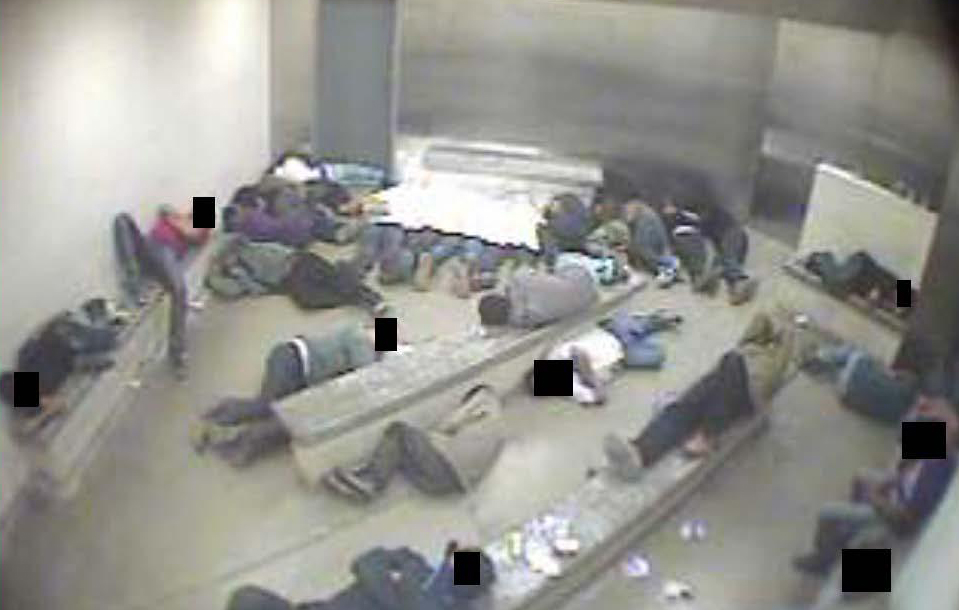 A federal judge ordered the Border Patrol to immediately cease its practice of refusing to provide basic amenities to people detained in Border Patrol holding cells in Tucson, Arizona. The judge cited evidence that shows that detainees are kept in freezing holding cells—often called “hieleras” or “iceboxes” —for days without any access to showers or basic hygiene and are forced to sleep on cold concrete floors with only a thin Mylar sheet. On November 18, Judge David C. Bury ordered the Border Patrol to immediately begin providing any detainee held for more than 12 hours with a mattress, as well as the opportunity to clean themselves, among other things.
A federal judge ordered the Border Patrol to immediately cease its practice of refusing to provide basic amenities to people detained in Border Patrol holding cells in Tucson, Arizona. The judge cited evidence that shows that detainees are kept in freezing holding cells—often called “hieleras” or “iceboxes” —for days without any access to showers or basic hygiene and are forced to sleep on cold concrete floors with only a thin Mylar sheet. On November 18, Judge David C. Bury ordered the Border Patrol to immediately begin providing any detainee held for more than 12 hours with a mattress, as well as the opportunity to clean themselves, among other things.
The preliminary injunction order came in the class action Doe v. Johnson, which was filed in 2015 by immigrant rights groups, including the American Immigration Council, on behalf of all individuals detained within the Border Patrol’s Tucson Sector, which includes most of Arizona. The order follows the judge’s decision in August to unseal video stills which depict the deplorable conditions.
In his order, the judge noted that these individuals are all civil detainees who have not been charged with any crime. Contrasting the conditions with criminal defendants held at local jails, the judge noted that a key witness for the Border Patrol admitted that conditions in the hold rooms were worse than conditions in local jails.
The Court’s order requires Border Patrol to immediately institute certain improvements in the conditions of the holding cells. First, the Border Patrol must provide all detainees held over 12 hours with “[c]lean bedding, which … must include a mat and a Mylar blanket.” Next, the judge agreed with plaintiffs that detainees have a right to personal hygiene, but that the existing conditions deprive them of the ability to clean themselves; not only did all but one facility lack showers, there was no hot water in the holding cells, no tooth brushes or toothpaste, and at times no soap. While acknowledging that the Border Patrol appeared to be making sincere efforts to improve the sanitary condition of the hold rooms, the judge ordered that all detainees be given access to “working toilets and sinks, soap, toilet paper, garbage receptacles, tooth brushes and toothpaste, feminine hygiene items, baby food, diapers, and clean drinking water,” and further ordered that the Border Patrol find a way for detainees held over 12 hours “to wash or clean themselves.”
Finally, the judge found that the Border Patrol was not adequately screening individuals for medical problems, which plaintiffs had argued was dangerous because many individuals held in Border Patrol custody have recently crossed the border “under extreme physical hardship, lacking in water and food, without access to medication and medical supplies.” The judge also found that the Border Patrol was not even meeting its own standards for medical screening. The Court ordered the Border Patrol to not only improve their procedures but also ensure that uniform standards of medical screening and care were adopted across the Tucson Sector.
Although the Border Patrol had argued that they didn’t have the resources to implement the changes asked for the plaintiffs, the judge was clear that “a deprivation of constitutional rights cannot be justified by fiscal necessity.”
Now that the judge has granted the preliminary injunction, the Border Patrol must begin implementing the order. In the meantime, as the case proceeds to trial, immigrants detained in the Tucson sector will have far more protection against the violation of their rights.
FILED UNDER: border patrol, Doe v. Johnson, featured, hierleras


